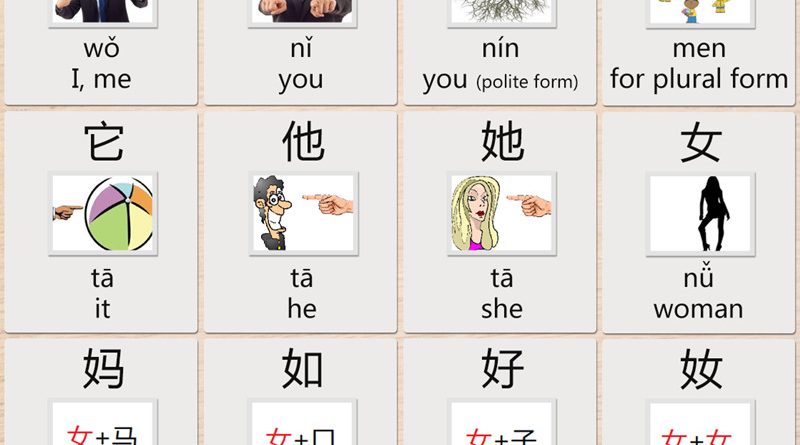Mastering Chinese Pronouns: The Complete Beginner’s Guide
Basic Chinese Personal Pronouns
For a quick pronoun review, pronouns are the words we use so we don’t have to use everyone’s names and titles every time we speak.
我 (wǒ) — I
你 (nǐ) — You
他 (tā) — He
她 (tā) — She
它 (tā) — It
You can start constructing simple sentences right away with “to be” 是 (shì). For example:
我是学生 (Wǒ shì xuéshēng) — I am a student.
你累了吗 (Nǐ lèile ma) — Are you tired?
她是法国人 (Tā shì fǎguó rén) — She is French.
他是歌手 (Tā shì gēshǒu) — He is a singer.
The same words are used in Mandarin, where in English we would use direct object pronouns like me, her and him.
他给了她礼物 (Tā gěile tā lǐwù) — He gave her a gift.
那是我的 (Nà shì wǒ de) — That is mine.
给我那本书 (Gěi wǒ nà běn shū) — Give me the book.
那是他的帽子 (Nà shì tā de màozi) — That is his hat.
You may have noticed that she, he and it are all pronounced tā (in the first tone). So, how do you tell the difference in spoken Chinese? You’ll have to rely on the context of the conversation.
Chinese Plural Pronouns
Although Chinese can often be a difficult language for English speakers to learn, pronouns are a relatively easy part of speech to study. For example, to make pronouns plural (from “I” to “we” and “she/he” to “they,” etc.), you only need to add the suffix 们 (men).
我们 (wǒmen) — We
你们 (nǐmen) — You (plural)
他们 (tāmen) — They
她们 (tāmen) — They
它们 (tāmen) — They
These plural Chinese pronouns will fit into sentences the way singular pronouns do. You can start building your vocabulary of verbs to use singular and plural Chinese pronouns in a range of contexts.
他们说英语 (Tāmen shuō yīngyǔ) — They speak English.
我们要牛肉汤 (Wǒmen yào niúròu tāng) — We want the beef soup.
我们可以去那里吗 (Wǒmen kěyǐ qù nàlǐ ma) — Can we go there?
你们都开心 (Nǐmen dōu kāixīn) — You all have fun!
Chinese Possessive Pronouns
Where in English we use entirely different words to indicate possession (my, her, our, etc.), Mandarin makes it easy again by using a grammatical construct with the pronouns you learned above to indicate possession.
You simply add the word 的 (de) after the pronoun.
我的朋友 (Wǒ de péngyou) — My friend
他的小狗 (Tā de xiǎo gǒu) — His puppy
这些苹果是她的 (Zhèxiē píngguǒ shì tā de) — These apples are hers.
我们的房子有两间卧室 (Wǒmen de fángzi yǒu liǎng jiān wòshì) — Our house has two bedrooms.
The Formal Chinese “You”
Unlike Korean and Japanese, neighboring nations that use many honorifics in their spoken languages, Chinese doesn’t have many formal versions of everyday words. There is one exception that’s fairly common though: 您 (nín), the formal version of “you.”
您 (nín) can be used any time you’re addressing someone formally. This could include addressing a boss or an elder. If you’re talking to someone you don’t know, using 您 (nín) is the most polite choice. You’ll likely hear 您 (nín) most often in greetings.
For example:
您好 (nín hǎo) — Hello! (formal)
Chinese Demonstrative Pronouns
Demonstrative pronouns are used to point to a specific noun by using words like this, that, these and those. Demonstrative pronouns are particularly helpful when beginning a new language, as you can use phrases with these pronouns to discuss objects you don’t know the word for.
这个 (zhège) — This
那个 (nàge) — That
这些 (zhèxiē) — These
那些 (nàxiē) — Those
这些是什么 (Zhèxiē shì shénme) — What are these?
那叫什么 (Nà jiào shénme) — What is that called?
这些多少钱 (Zhèxiē duōshǎo qián) — How much for those?
Chinese Reflexive Pronouns
Yet again, Mandarin gives us a handy grammatical construction rather than a bunch of new words to express ourselves using Chinese pronouns. Use the word 自己 (zìjǐ) to make a pronoun reflexive (meaning to refer back to yourself or to himself, etc.).
我自己 (wǒ zìjǐ) — Myself
你自己 (nǐ zìjǐ) — Yourself
他自己 (tā zìjǐ) — Himself
她自己 (tā zìjǐ) — Herself
它自己 (tā zìjǐ) — Itself
我自己写的 (Wǒ zìjǐ xiě de) — I wrote it myself.
她自己唱歌 (Tā zìjǐ chànggē) — She sang it herself.
他们自己完成了考试 (Tāmen zìjǐ wánchéngle kǎoshì) — They finished the exam themselves.
Chinese Interrogative Pronouns
When learning English, we learn the interrogative pronouns as the “Five Ws,” or who, what, when, where and why (though there are actually more than five interrogative pronouns). Add additional interrogatives like how and you can who/what/when/where yourself through any social situation in Chinese.
谁 (shuí) — Who
他是谁 (Tā shì shuí) — Who is she?
什么 (shénme) — What
你叫什么名字 (Nǐ jiào shénme míngzi) — What is your name?
哪个 (nǎgè) — Which
你喜欢哪个 (Nǐ xǐhuān nǎge) — Which one do you like?
哪儿 (nǎ’er) or 哪里 (nǎlǐ ) — Where
巴士在哪里 (Bāshì zài nǎlǐ) — Where is the bus?
什么时候 (shénme shíhou) — When
音乐会是什么时候 (Yīnyuè huì shì shénme shíhòu) — When is the concert?
怎么 (zěnme) — How
我怎么写这个词 (Wǒ zěnme xiě zhège cí) — How do I write this word?
为什么 (wèishénme) — Why
为什么取消课程 (Wèishéme qǔxiāo kèchéng) — Why is class canceled?
No matter what your personal language learning path is, you’ll find that mastering the use of Chinese pronouns will get you going strong in Chinese conversations!
